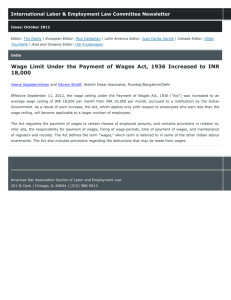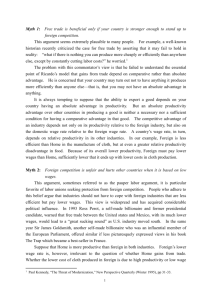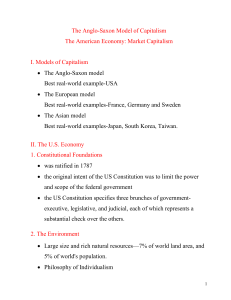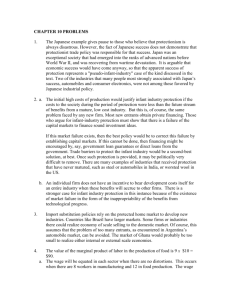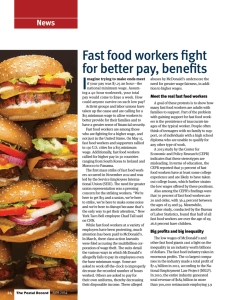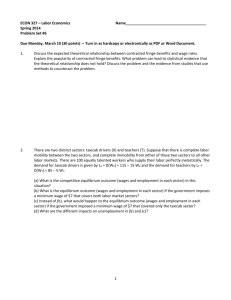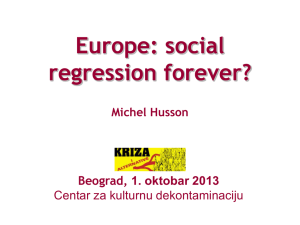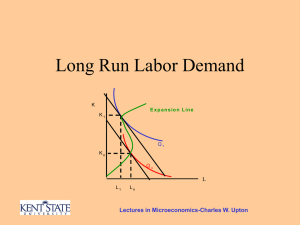Defending Sweatshops - Columbia University
advertisement
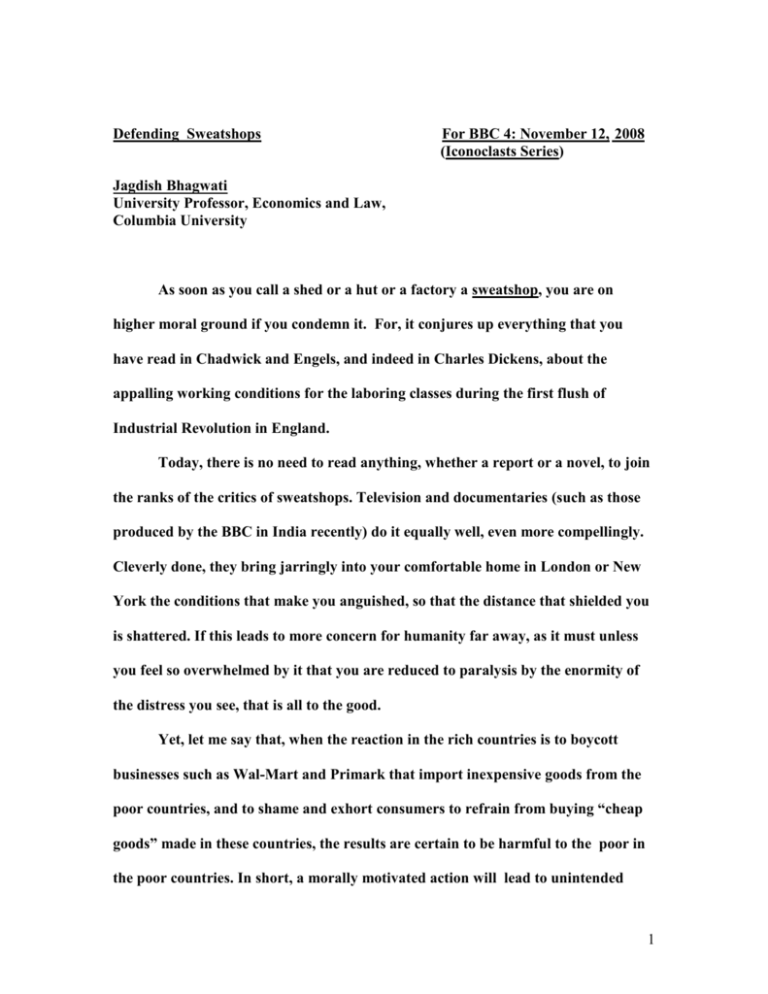
Defending Sweatshops For BBC 4: November 12, 2008 (Iconoclasts Series) Jagdish Bhagwati University Professor, Economics and Law, Columbia University As soon as you call a shed or a hut or a factory a sweatshop, you are on higher moral ground if you condemn it. For, it conjures up everything that you have read in Chadwick and Engels, and indeed in Charles Dickens, about the appalling working conditions for the laboring classes during the first flush of Industrial Revolution in England. Today, there is no need to read anything, whether a report or a novel, to join the ranks of the critics of sweatshops. Television and documentaries (such as those produced by the BBC in India recently) do it equally well, even more compellingly. Cleverly done, they bring jarringly into your comfortable home in London or New York the conditions that make you anguished, so that the distance that shielded you is shattered. If this leads to more concern for humanity far away, as it must unless you feel so overwhelmed by it that you are reduced to paralysis by the enormity of the distress you see, that is all to the good. Yet, let me say that, when the reaction in the rich countries is to boycott businesses such as Wal-Mart and Primark that import inexpensive goods from the poor countries, and to shame and exhort consumers to refrain from buying “cheap goods” made in these countries, the results are certain to be harmful to the poor in the poor countries. In short, a morally motivated action will lead to unintended 1 immoral outcomes. As the English proverb goes, the road to hell is paved with good intentions. Working Conditions and Wages: Two Different Issues To understand this paradox, one has to distinguish between working conditions and low wages. The assault on appalling working conditions should have our support but it needs to be more nuanced and re-focused. The objection to low wages, on the other hand, is wholly mistaken and needs to be abandoned. Take each, in turn. Working Conditions: The appalling working conditions are deplorable and there is simply no excuse for any employer, for instance, to expose workers to hazardous fumes and to readily avoidable risk as when workers in foundries are issued goggles for eye protection. But we need to keep in mind that full Western-style protections are not affordable in poor countries which generally lack many of the protections that have come gradually with development, while insisting that there are many low-cost protections which are well within reach and which every society today owes to its workers and citizens. But the documentaries that show refugee children being treated in an inhumane way in sweatshops that supply some of the Western multinationals, miss the point, I am afraid. The problem is not their becoming part of a multinational’s supply chain; rather it is that there needs to be enforcement of protections to refugee children, to children in servitude, to bonded labour generally. If that is not done, the effect of getting Wal-Mart and Primark to avoid the use of child labour 2 will simply be to shift these children into yet other exploitative production, even into prostitution. This is what happened when the impending Harkin Bill in the US Congress, which would have prohibited the importation of goods where child labour had been used, led to several female children being discharged in Bangladesh garments manufacture and some of them then were re-deployed by poor parents into prostitution. The truly helpful re-focus of the anti-sweatshop groups that urge boycotts would therefore be to offer their support instead to the local NGOs to agitate for the effective prohibition of unacceptable practices such as the use of bonded labour and refugees, child and adult, and inhumane working conditions , anywhere in their countries. In fact, in India, an active Supreme Court has done precisely this since the 1980s: I might add with self-indulgent satisfaction that my brother, the former Chief Justice of India, has led an activist Court in this regard. Moreover, substantial local NGOs have been doing the necessary follow-through work, which amounts to heavy lifting, against the use of bonded labour and children, ensuring that children are not merely taken off work but also have schools to attend to, and much else that needs to be done to make the country effectively address these issues that must concern us all. Wages: But when it comes to wages, the problem with the anti-sweatshop agitation is not one of lack of nuance and proper policy focus. It is more serious: it is almost certainly wrong in principle. 3 Unfortunately, nearly all the campaigns against sweatshops deplore the payment of low wages, often saying that a high, “living wage” ought to be paid. There are several reason why this demand defies good sense. Poor countries naturally have low wages; after all, they are poor. Typically, empirical studies show that multinationals pay what economists call an average “wage premium” to their lowest-skill workers of about 10% compared to what they can earn in alternative occupations. But the wages, even then, cannot compare with what we see in the less poor countries. Then again, many campaigns typically compare the abysmally low wages paid to the huge prices paid in the retail markets of the rich countries. But this too is misleading. If Ann Klein sells a designer jacket for 100 British Pounds on Bond Street in London, the true return from that jacket is a tenth: since nine other designs will fail. Then, the high duties which typically apply to textiles must be allowed for. Next, insurance and freight, and the mark-up by importers which usually runs 100% of landed price, have to be allowed for. Again, the jacket price includes the cost of materials which can make a huge difference if these raw materials are expensive, as with fine cotton. To see this most dramatically, turn to diamond polishing in the many small shops in Surat, India. The price of the polished diamonds can be 10,000 Pounds while the cost of the raw diamonds may be 9,500 Pounds and it is the difference of 500 Pounds (which economists call value added) and not the sales price of 10,000 Pounds, that should be related to what the workers are paid. 4 Again, the notion that our firms should pay in the poor countries a “living wage”, which exceeds the wage being paid in these countries, is emotionally appealing. But it raises many difficulties. Thus, one must ask: how can we meaningfully define such a wage? Typically, I have seen calculations made for a family of four. One must then work with some notion of a necessary consumption basket for this family. But many poor people have larger families. And when young, often female, workers are employed in the Export Processing Zones, they are single. Again, everyone will have their own notions of what a decent consumption basket should contain. Societies resolve these problems politically when they sometimes define a minimum wage. But when we ask specific firms to pay what some NGOs in England or the United States have decided what the wage “ought” to be, that is different. We are then asking our firms to be altruistic in wages paid, by effectively subsidizing the wage over what the market pays, as a sort of Corporate Social Responsibility (CSR). But then these firms are entitled to respond: we are typically paying the going wage, and at times even more, when we hire local workers; should we then pay these workers more as part of our CSR or should we instead choose to build a playground for the community in which we operate, for instance? CSR surely can, and should, take a multitude of forms. Rewarding workers who are already doing better than their equally impoverished brethren is not my idea of what I would do by way of my CSR; and you should not be able to browbeat me into saying that your way should be my way. But it is astonishing how many NGOs get carried away into holding precisely these attitudes. So, the anti-sweatshop 5 coalition on several US campuses wants to exclude suppliers to the $3.5 billion academic market from supplying sweatshirts and shoes if they do not buy into one or two certifying agencies. But that takes away the freedom for others who do not accept some or more of the qualifying criteria (such as a “living wage”), an unacceptable situation on campuses where we teach that we ought to practice virtue but not how. But, even if we were not to force CSR into a straitjacket of enforced moral content, the overriding problem with urging voluntary boycotts of Wal-Mart and Primark is that the most powerful policy instrument for removing poverty is growth. And buying goods from the poor countries, where wages are low and whose exported products are cheap, is a surefire way to generate that growth. Both China and India have managed, with their shift to outward-oriented trade policies and complementary reforms, to pull literally hundred of millions of their poor out of poverty. Getting our citizens, and especially the idealistic young, to unwittingly throw away that ladder out of poverty for the poor in the poor nations is to frustrate, rather than advance, the moral objectives that have spawned the antisweatshop movements. 6 7


